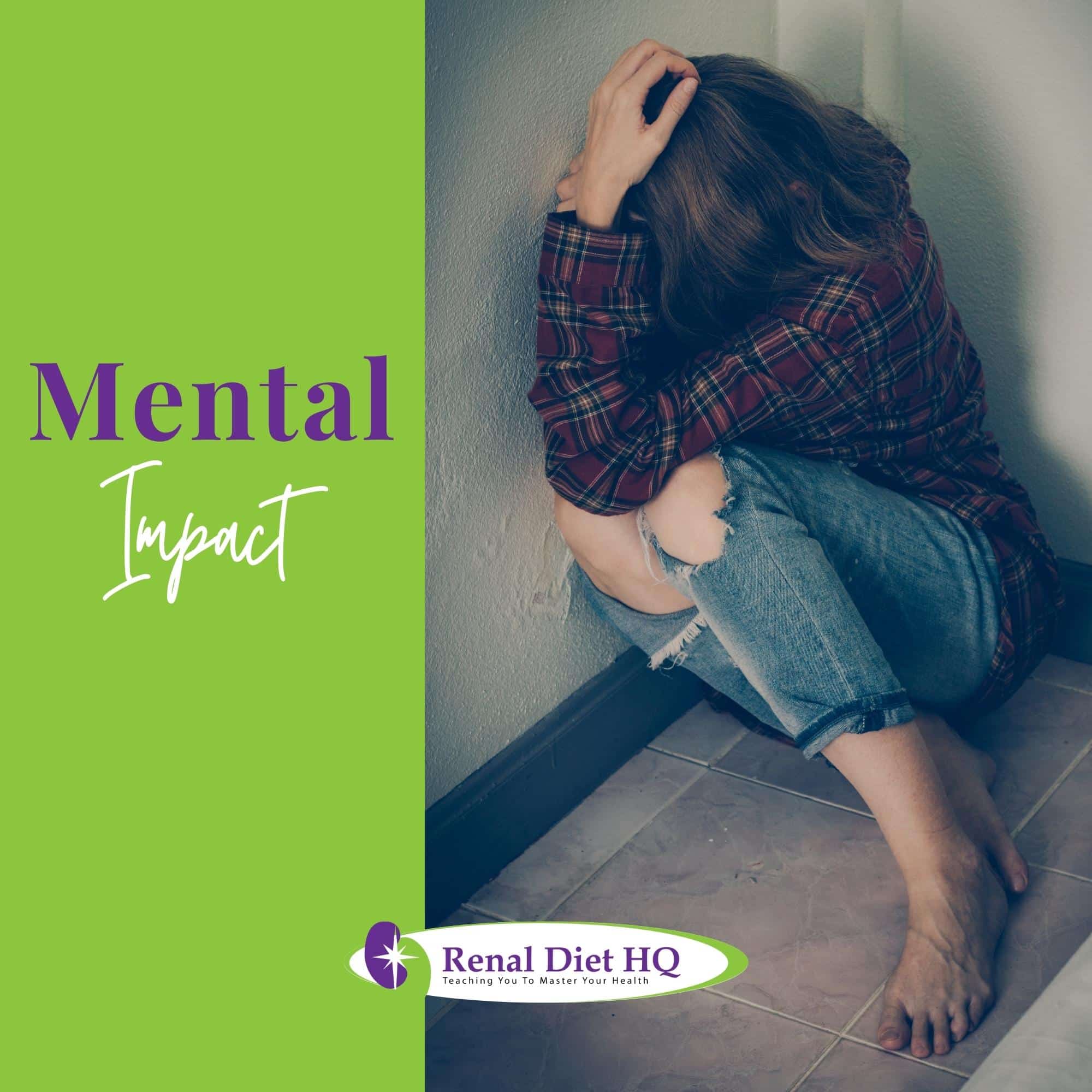How Does Kidney Disease Affect Daily Life
Newly diagnosed with CKD? Receiving a chronic health diagnosis is more than just being handed a name of an illness. It is being handed a life sentence, and it impacts your daily life significantly. Knowing you have a chronic illness, of course, is better than not knowing. The diagnosis can save your life, but it can also change everything.
Chronic kidney disease already does affect your every moment, but until your diagnosis you might not have been truly aware of what is happening to your body.
If you were having symptoms, it could have just been something as simple as a minor infection or smaller issue. Instead, it turns out to be a chronic illness- something that will never go away. The repercussions of this can be daunting.

Kidney disease can affect your mental well-being too, causing feelings of anxiety, depression, and stress. It's essential that you manage these emotions effectively so they don't obstruct your treatment path.
Despite its hardships, effective management of kidney disease is within your reach - empowering you to adapt to new routines while maintaining an improved quality of life.
By understanding potential dietary risks and making necessary lifestyle transformations, you can take control of your condition rather than letting it control you.
Jump to:
- Key Takeaways
- Understanding the Condition
- Physical Symptoms
- Mental Impact
- Importance of Early Detection
- Day-to-day Challenges
- Diet and Kidney Health
- Medical Tests and Monitoring
- Potential Dietary Risks
- Effective Disease Management
- Living with Kidney Disease
- FAQs for How Kidney Disease Affects Daily Life
- Diet and Lifestyle Changes Can Help Manage Kidney Disease
Key Takeaways
- Kidney disease affects various aspects of daily life, including physical symptoms, dietary changes, and overall well-being.
- Regular checkups, early detection, and intervention are crucial in slowing or stopping the progression of kidney disease and preventing further loss of kidney function.
- Despite the challenges, individuals have control over their condition and can make positive choices to manage the disease.
- Maintaining a positive mindset and seeking knowledge and support are essential in adapting to a new lifestyle with kidney disease.
For More Recipes and Ideas --->> Get Your Free Meals and Recipes That Are Perfect for Pre-Dialysis Diets, Pre-Dialysis with Diabetes, or Dialysis Diets.
Understanding the Condition
Understanding your condition is the first step in managing kidney disease and its impact on your daily life.
It's not just a physical battle but also a mental one. The diagnosis can trigger a range of emotions, including stress, depression, and anxiety. It's crucial to manage these emotions effectively and seek mental health resources when needed.
Remember, you're not alone in this journey. There are numerous resources available to help you navigate through this challenging time without losing sight of the joys of daily living.

Physical Symptoms
Physically, of course, kidney disease can affect your entire body. Depending on the stage of renal failure a patient is in, and how well that patient cares for themselves, the physical repercussions can be pretty significant.
In the beginning stages of chronic kidney disease, there may be very few, if any, symptoms. This is why regular checkups with your doctor are so important.
Who is more prone to kidney disease? With advanced kidney disease, you may start to experience symptoms like swollen legs, itchy skin, urinating during the night, shortness of breath, muscle weakness, fatigue, loss of appetite, and weight loss.
The good news is that you can do something about these symptoms. The earlier you realize you have kidney disease, the more you can do about it.
Through proper lifestyle choices, you can slow the progression of kidney disease.
Diet especially has a huge impact on the progression of kidney disease.
You will not be able to regain any lost function, but you can prevent any further loss with the right treatment for kidney disease.
| Symptom | Management Strategy | Support Needed |
| Muscle Weakness | Balanced protein intake; resistance training or extended endurance training | Exercise recommendations from a physiotherapist |
| Fluid Retention | Limiting extra fluid intake and salt intake | Guidance from a dietitian and nephrologist |
| Weight loss | Increasing your daily calories can help you reach a healthy body weight | Ongoing communication with your dietitian |
Remember that you're not alone in this journey. Emotional support is crucial during these trying times – don't hesitate to reach out to loved ones or join a support group for individuals dealing with kidney disease.

Mental Impact
Facing a chronic illness like kidney disease can take a serious toll on your mental health. It can leave you grappling with emotional health issues ranging from stress and anxiety to stages of depression.
The mental impact of receiving a chronic illness diagnosis such as kidney disease can and will affect a person's daily life. The psychological impact is profound as you navigate daily life while managing the physical symptoms of kidney disease.
You may struggle with questions like 'Why me?' or 'How will I live with this?'. It's perfectly normal to feel overwhelmed at times, and you shouldn't hesitate to reach out for help.
The hope is that you can overcome your mental anguish so that you can focus on what to do next.
As challenging as this journey may be, there are strategies that can help:
- Cultivating coping strategies such as mindfulness exercises or cognitive behavioral techniques. These can help manage anxiety and depression associated with your diagnosis.
- Developing strong support systems among family, friends, and healthcare professionals. A community who understands and empathizes with your situation will be invaluable in maintaining emotional well-being. These networks provide emotional support, practical advice, and shared experiences that can help alleviate feelings of isolation.
- Accessing mental health resources specific to individuals living with chronic illnesses. Professional counseling services can provide tools for navigating the psychological impact of kidney disease.
Your emotional well-being plays a crucial role in managing your overall health. With appropriate coping strategies, strong support systems, and accessible mental health resources, you'll be better equipped to face the challenges that come with kidney disease. It's essential not only for adapting to the new normal but also for embracing life despite it.
Importance of Early Detection
Regular checkups with your health care team can identify any abnormalities in kidney function even before you notice any physical symptoms.
The importance of early detection cannot be overstated. Early diagnosis of kidney disease is crucial for preventing progression and managing symptoms effectively.
Early detection opens up a wide array of treatment options that can slow down or even halt the progression of the disease. It also allows for lifestyle modifications to be implemented sooner rather than later, which plays a pivotal role in maintaining kidney health.
These changes might include dietary adjustments, exercise routines, medication regimens, or stress management techniques. Remember that knowledge is power. Understanding your condition empowers you to take control over its management and impact on your daily life.
Day-to-day Challenges
Living with chronic kidney illness presents day-to-day challenges that encompass physical symptoms, emotional toll, and necessary lifestyle adjustments.
Here are some areas where you may need to make changes due to kidney disease:
- Dietary restrictions: Modifying your diet to reduce strain on your kidneys.
- Frequent medical appointments: Regular check-ups and treatments become a part of your routine.
- Emotional wellness: Dealing with a chronic illness can lead to stress, anxiety, or depression.
- Physical limitations: Fatigue or discomfort may limit your daily activities.
- Medication management: Keeping track of various medications becomes essential.
Arming yourself with coping strategies is crucial in managing these challenges.
Exploring treatment options with healthcare professionals becomes essential to manage symptoms effectively while ensuring optimal health outcomes. This may consist of kidney doctors and dieticians who provide personalized advice based on your current stage of kidney disease and any other medical conditions that you may have.
Prioritizing emotional well-being is as important as looking after physical health. A support system becomes invaluable when navigating through these changes – ensuring you don't walk this path alone. Engaging support networks, such as friends, family, or patient groups, can provide emotional comfort and practical advice.
Remember, it's about finding balance in this new normal while maintaining quality of life despite the demands of kidney disease.
Diet and Kidney Health
When it comes to preserving your renal health, the importance of a tailored healthy diet can't be overstated. Certain dietary restrictions become necessary with chronic kidney disease to manage your condition and slow its progression.
Meal planning is crucial in this journey. It's not just about what you eat, but also when and how much.
Developing a comprehensive understanding of nutrition education is crucial. It empowers you with knowledge on which foods are beneficial for your kidneys and which ones pose potential harm.
For instance, reducing sodium intake may help control high blood pressure levels—a common complication and risk factor of kidney disease—while avoiding excess proteins could ease the workload on your kidneys.
Remember that these dietary changes don't have to be boring or bland. There are plenty of kidney-friendly recipes available that combine taste with health benefits. Numerous renal diet resources offer advice, tips, and recipe ideas to help you maintain a balanced proper diet while catering to your specific needs.
Navigating through these changes might seem daunting at first, but remember: every healthy choice counts towards managing your condition better and improving your overall quality of life.
Medical Tests and Monitoring
Keeping tabs on your health through regular medical tests and monitoring is crucial when managing chronic kidney disease.
Regular lab tests can provide a clear picture of kidney function, allowing you and your healthcare team to track the progression of the disease over time.
- Medical Tests: These may include blood tests to measure blood creatinine levels, which help calculate eGFR (estimated glomerular filtration rate), an important indicator of kidney function. Urine tests can also be conducted to check for protein, another sign of kidney damage.
- Reading Test Results: It's essential to understand what specific lab values mean in relation to overall kidney health. A decrease in eGFR or an increase in the amount of protein in urine could indicate worsening function.
- Test Frequency: Different stages of kidney disease require different screening schedules, with more frequent testing required during the more advanced stages of kidney disease.
Staying vigilant about this tracking process gives you a proactive role in managing your condition and making informed decisions about treatment options.
By adhering strictly to monitoring guidelines, understanding relevant lab values, and maintaining consistent test frequency, you can help safeguard against further deterioration of your renal health.
Remember that early detection and intervention are key strategies for slowing the progression of chronic renal disease.
Potential Dietary Risks
It's essential to be aware of potential dietary risks that can exacerbate chronic kidney disease. Your food choices can significantly impact your health, especially when dealing with a condition such as this. Dietary precautions are not just recommendations; they're necessary steps in managing your disease effectively.
Nutritional considerations play an integral role in maintaining your health while living with kidney disease. Certain foods high in sodium, potassium, and phosphorus can put extra strain on your kidneys and may have to be limited. It's crucial to understand these dietary restrictions and adhere to them closely for optimal kidney function.
Be mindful of the beverages you consume as well. Certain fruit juices, like orange juice, may pose dietary risks due to their high mineral content. Always remember that every bite or sip counts when it comes to preserving normal kidney function.
Seeking professional dietary guidance is recommended. A renal dietitian has expertise in identifying the best foods for you and creating a special diet that caters to your nutritional needs while keeping your kidney healthy.
Implementing these measures into your daily life will help manage kidney disease more effectively and improve overall well-being. Don't underestimate the power of correct nutrition in combating this chronic condition.
Effective Disease Management
Navigating the path of chronic kidney disease isn't easy, but with the right strategies, you can manage your condition effectively and maintain your quality of life.
One key aspect to consider is medication adherence. It's vital to take prescribed medications at the correct times and dosage as advised by your healthcare team. Any alterations or inconsistencies may lead to further complications.
Once you are diagnosed with kidney failure, or end-stage renal disease, receiving dialysis treatments or getting a kidney transplant from a kidney donor becomes essential.
For dialysis patients, there are two main types of dialysis available: hemodialysis and peritoneal dialysis. The choice of dialysis method depends on various factors, including the patient's medical conditions, lifestyle, and preferences.
Equally important are lifestyle choices, such as maintaining a balanced diet, getting regular exercise, and abstaining from harmful habits like smoking or excessive drinking. These actions not only help manage symptoms but also play an integral role in overall disease prevention.
Support systems cannot be overlooked. Surrounding yourself with positive influences from friends, family, and support groups can boost your mental resilience during this challenging journey.
Recognize that it's okay to have difficult moments – these feelings are normal when coping with a chronic illness like kidney disease. Remember that managing kidney disease involves a holistic approach, addressing both medical treatment and personal well-being, for effective long-term health management.
Living with Kidney Disease
Living with kidney disease isn't a walk in the park, but it's certainly manageable with the right mindset and lifestyle adjustments. It's important to remember that every person's journey is unique, but there are common threads that can help guide your path.
Coping strategies: Developing effective coping mechanisms can be instrumental in managing kidney disease. This might include stress management techniques like meditation or deep-breathing exercises.
Support systems: Having a strong network of family, friends, and healthcare professionals can provide emotional support and practical assistance when you need it most.
Lifestyle adjustments: This might involve dietary changes, regular exercise, or modifications to your daily routine to accommodate treatment schedules.
Emotional well-being: Prioritizing mental health is just as crucial as physical health when living with kidney disease.
Understanding the facets of this condition can make navigating life easier for people with kidney disease. Consider joining a support group where you can connect with others facing similar challenges.
Remember that while kidney disease may be part of your life, it does not define you or limit your potential for joy and fulfillment in your everyday experiences.
FAQs for How Kidney Disease Affects Daily Life
Managing chronic kidney disease can have significant financial impacts on both individuals and their families as the cost of dialysis and medications can be quite high, leading to the depletion of savings and the need for budget adjustments.
Additionally, insurance coverage may not fully cover all the expenses associated with the disease, further adding to the financial strain. In some cases, individuals may even face the possibility of medical bankruptcy.
Given these challenges, it is crucial for individuals and their families to engage in thorough financial planning to navigate these potential hardships. Being prepared financially is a critical aspect of dealing with this chronic condition.
Chronic kidney disease can have a significant impact on a person's social relationships and interactions. The emotional stress that comes with the disease can strain relationships. This can lead to changes in relationship dynamics as the individual may also require more support than before.
However, it is important to remember that having a strong support system is crucial for managing this disease. Open dialogue about the condition can help lessen misunderstandings and foster stronger bonds during these challenging times.
As someone with kidney disease, you may encounter occupational challenges.
These challenges can include job performance issues due to fatigue or the need to take time off for dialysis. Additionally, you might face career limitations based on your physical capabilities.
Stress from work can also exacerbate your condition. To address these challenges, workplace accommodations are essential for job retention.
It is important to discuss your concerns with your employer and explore reasonable adjustments. By doing so, you can effectively manage these challenges while maintaining your professional life.
Chronic kidney disease can affect your sexual health and intimacy.
You may experience decreased sexual desire or struggle with maintaining an erection or lubrication. Fertility may also be affected, causing difficulties in conceiving.
It's essential to openly discuss these changes with your partner and healthcare provider to manage them effectively.
Kidney disease can impose travel restrictions and require careful vacation planning. Dialysis logistics may necessitate scheduling treatments at your destination, potentially limiting your recreational activities.
Mobility issues might arise due to fatigue or fluid buildup, possibly hindering participation in demanding physical activities.
Nonetheless, with proper management and consultation with your renal care team, you can still enjoy safe travels and leisure pursuits while working towards healthy kidneys.
Diet and Lifestyle Changes Can Help Manage Kidney Disease
Kidney disease does affect your entire life. Your daily life, from how you feel to every bite you put in your mouth, will change.
Living with kidney disease can be challenging, but it's not insurmountable. You've got to stay proactive in managing symptoms, make necessary dietary changes, and prioritize regular check-ups with your health care provider.
You still have control despite how you might be feeling. Know that you can take control of your condition by choosing to be positive and making healthy changes to your diet and lifestyle. So, take control and navigate this journey confidently.




















